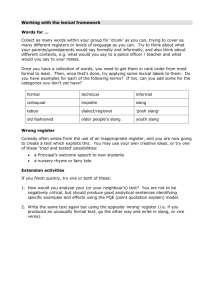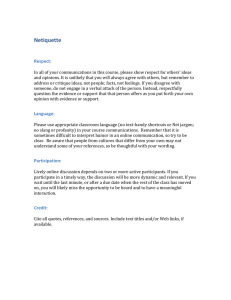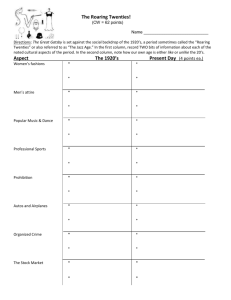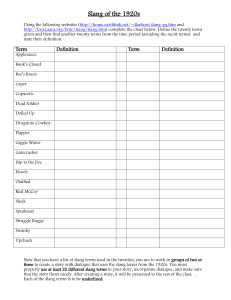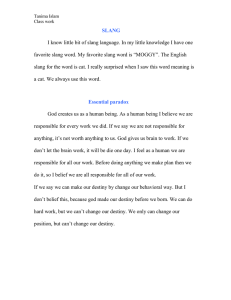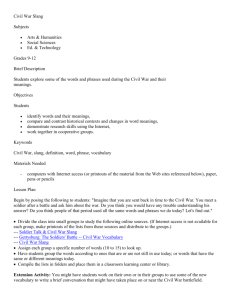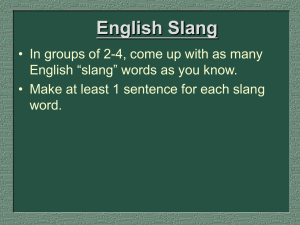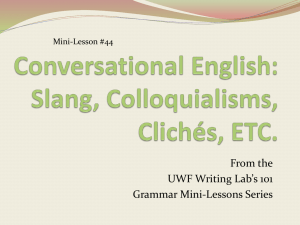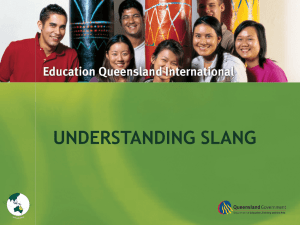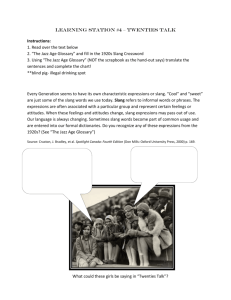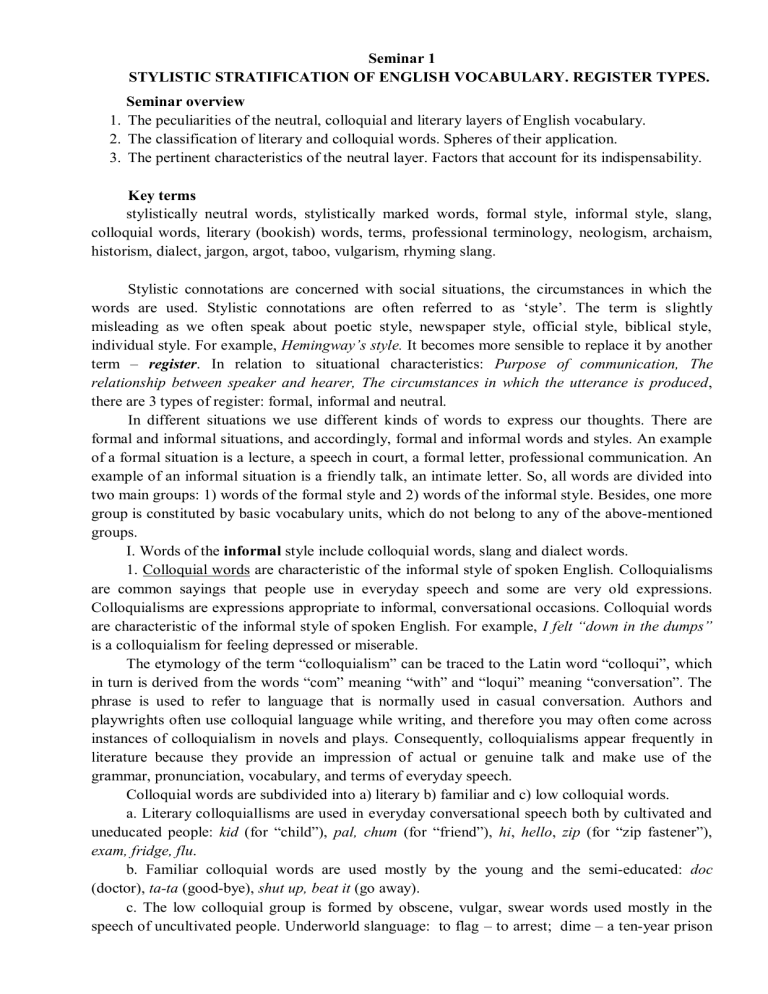
Seminar 1 STYLISTIC STRATIFICATION OF ENGLISH VOCABULARY. REGISTER TYPES. Seminar overview 1. The peculiarities of the neutral, colloquial and literary layers of English vocabulary. 2. The classification of literary and colloquial words. Spheres of their application. 3. The pertinent characteristics of the neutral layer. Factors that account for its indispensability. Key terms stylistically neutral words, stylistically marked words, formal style, informal style, slang, colloquial words, literary (bookish) words, terms, professional terminology, neologism, archaism, historism, dialect, jargon, argot, taboo, vulgarism, rhyming slang. Stylistic connotations are concerned with social situations, the circumstances in which the words are used. Stylistic connotations are often referred to as ‘style’. The term is slightly misleading as we often speak about poetic style, newspaper style, official style, biblical style, individual style. For example, Hemingway’s style. It becomes more sensible to replace it by another term – register. In relation to situational characteristics: Purpose of communication, The relationship between speaker and hearer, The circumstances in which the utterance is produced, there are 3 types of register: formal, informal and neutral. In different situations we use different kinds of words to express our thoughts. There are formal and informal situations, and accordingly, formal and informal words and styles. An example of a formal situation is a lecture, a speech in court, a formal letter, professional communication. An example of an informal situation is a friendly talk, an intimate letter. So, all words are divided into two main groups: 1) words of the formal style and 2) words of the informal style. Besides, one more group is constituted by basic vocabulary units, which do not belong to any of the above-mentioned groups. I. Words of the informal style include colloquial words, slang and dialect words. 1. Colloquial words are characteristic of the informal style of spoken English. Colloquialisms are common sayings that people use in everyday speech and some are very old expressions. Colloquialisms are expressions appropriate to informal, conversational occasions. Colloquial words are characteristic of the informal style of spoken English. For example, I felt “down in the dumps” is a colloquialism for feeling depressed or miserable. The etymology of the term “colloquialism” can be traced to the Latin word “colloqui”, which in turn is derived from the words “com” meaning “with” and “loqui” meaning “conversation”. The phrase is used to refer to language that is normally used in casual conversation. Authors and playwrights often use colloquial language while writing, and therefore you may often come across instances of colloquialism in novels and plays. Consequently, colloquialisms appear frequently in literature because they provide an impression of actual or genuine talk and make use of the grammar, pronunciation, vocabulary, and terms of everyday speech. Colloquial words are subdivided into a) literary b) familiar and c) low colloquial words. a. Literary colloquiallisms are used in everyday conversational speech both by cultivated and uneducated people: kid (for “child”), pal, chum (for “friend”), hi, hello, zip (for “zip fastener”), exam, fridge, flu. b. Familiar colloquial words are used mostly by the young and the semi-educated: doc (doctor), ta-ta (good-bye), shut up, beat it (go away). c. The low colloquial group is formed by obscene, vulgar, swear words used mostly in the speech of uncultivated people. Underworld slanguage: to flag – to arrest; dime – a ten-year prison sentence; to make – to rob, steal; Vulgar word (vulgarism), a phrase or word characterizing (used in) coarse, ignorant speech. Vulgar terms are to be used only when one is aware of and desires their strong effect. E.g., shit-all – not any; none at all. Taboo words, forbidden, prohibited, banned. For the most part these are four-letter words, names or abusive terms. Taboo terms are never to be used. E.g., nigger – a black person; slant-eye – an Asian person; fuckhead – a despicable person. Colloquial words should not be used under formal circumstances, in compositions and reports. 2. Slang words. All or most slang words are metaphores rooted in a joke: nuts (for “heads”), mugs (for “faces”), flippers (for “hands”), etc. Slang is mainly used by the young and helps the speakers dissosiate themselves from others. In the course of time slang words either disappear or become neutral lexical units (slang is colourful, humourous and catching and may be accepted by all the groups of speakers). The more we talk and text our conversations, the more we seek to distinguish and express ourselves with unique and creative vocabulary. When we do, it’s only a matter of seconds before an interesting new coinage makes itsway around the world. Some of the recent slangish blend words are “definotly” (definitely + not: most definitely not), “flabdomen” (flab + abdomen: a flabby midsection), “irritainment” (irritate +entertainment: the annoying and degrading reality-based entertainment and media spectacles one finds impossible to resist), “mancation” (man +vacation: a men’s-only vacation; typically a weekend jaunt during which men bond and relax during rounds of golf, steak dinners, and plenty of beer), “resolutionary” (resolution + revolutionary: a person who makes a New Year’s resolution to join a gym and then quits after a few months), “ringxiety” (ring + anxiety: the panic and fear induced by one ringing cell phone in a crowd, causing everyone to scramble for their phone lest they miss a call). Jargon is words or phrases used by people in a particular job or group that can be difficult for others to understand. Such words are usually motivated and, like slang words, have metaphoric character, e. g. bird (“spacecraft”) /astronauts’ jargon/; to grab (“to make an impression on smb.”) /newspaper jargon/; grass, tea, weed (“narcotic”) / drug addicts’ jargon/, etc. Words such as “backup”, “chatroom” and “browser” are computer jargon. Jargon is often referred to as “technical language”. It makes communication quicker and easier among members of a group who understand it. Among social jargons cant or argot (thieves jargon) stands somewhat apart. Cant words are nonmotivated and have special “agreed-upon”, secret meanings, e. g. book (“life sentence”), splosh (“money”), to rap (“to kill”), etc. Professionalisms are sub-standard colloquial words used by people of a definite trade or profession. Such words are informal substitutes for corresponding terms, e. g. Hi-Fi (“high fidelity”), smash-up (“accident”), anchor (“brakes”), etc. Argot are words used by criminals, it’s not widely used. It’s a mini-language. These words are non-motivated and have special “agreed-upon”, secret meanings, e. g. book (“life sentence”), splosh (“money”), to rap (“to kill”), etc. Rhyming slang can be defined as a formation of a compound word, which rhymes with a common word, but which doesn’t have any semantic connection with it. The resultant word is facetious and humorous. Rhyming slang is London’s East End cockney slang and substitutes a rhyme for the word in mind. E.g., cod’s roe – dough (money); custard and jelly – telly (television); bacon and eggs – legs. In speech the actual rhyming word is often omitted. E.g., I like me glass of pig’s. [Pig’s ear – beer]; That’s worth a lot o’ bees. [Bees and honey – money]. Slanguage (special slang, professional and/or social jargon) is peculiar for some social or professional group. E.g., U.S. teenage slanguage: newbs – new boys; moon-man – a person not like us; butter – a student who fawns on others, especially on teachers; grungy – shabby, dirty. College/University student slanguage: to ace – to do very well on a test; rack – female chest, a bed; to scope – to look over at a classmate’s exam paper; frat – a college fraternity. Afro-American slanguage: a – yes, correct; to zap – to move quickly; a handkerchief head – an Uncle Tom; ripped – intoxicated. Hauliers’ slanguage: anchor – a brake; Chinese dominoes – a load of bricks; pimple – a steep hill; pipe – a telephone. Moving-picture slanguage: niggers – blackboards used to ‘kill’ unwanted reflections from the powerful lights; inkies (fr. incandescent) – lights. 3. Dialect words. A dialect is a variety of a language which prevails in a district: there are, for instance, Lancashire, Dorsetshire, Yorkshire, Norfolk dialects in Britain, Nothern, Midland and Southern dialects in the USA. Dialectal words can be transferred into the common stock (or the basic vocabulary): many frequent words of common use are dialectal in origin, such as girl, one, raid, glamour, car, tram. In works of fiction dialect words are used to render the speech of the characters, to create a realistic effect. II. Words of the formal style fall into two main groups: learned words and professional words (terms). 1. Learned words. Learned words include several subdivisions of words: literary, or refined words, poetic words, words used in scientific prose and officialese. a) literary or refined words, that often sound foreign: solitude, felicity, cordial (=hearty). These words are not stylistically homogeneous. b) poetic words (poetic diction), which have a high-flown, archaic colouring: Alas!, realm, wroth, morn (for “morning”), eve (for “evening”), welkin. These words are stylistically marked; they form a lexico-stylistic paradigm. In the 17th-18th centuries they were widely used in poetry as synonyms of neutral words. In modern poetry such a vocabulary barely exists. Poetic words are diverse; they include: a) archaic words (commix – mix); b) archaic forms (vale – valley); c) historic words (argosy – large merchant ship); d) poetic words proper (anarch, brine). Their main function is to mark the text in which they are used as poetic, thus distinguishing it from non-fiction texts. In modern poetry such words are seldom used. Their stylistic meaning gets more vivid when they are contrasted to neutral words. c) words that are used in scientific prose: comprise, compile, experimental. d) officialese: assist (for “help”), proceed (for “go on”), sufficient (for “enough”), inquire (for “ask”), approximately (for “about”). 2. Obsolete words stand close to “learned” words, esp. poetic words. They are words which are partially or fully out of circulation and can be found in books only: damsel (for “girl”), yon (there), foe (enemy), aught, chop-house – lexical archaisms, thou, thy (your), speaketh (for “you speak”) – grammatical archaisms. All of them can be replaced by neutral synonyms, e. g. hark (“listen”), deem (“think”), glee (“joy”), aught (“anything”), nigh (“near”). Among archaic words one should distinguish historical words that denote no-longer existing objects, e. g. yeoman, fletcher, gleeman, galleon, goblet, lute, vizor, cataphract, childe, visor, etc. Historical words have no neutral synonyms in Modern English. Archaic words that denote existing objects are divided into two groups: a) archaic words proper: words which are no longer recognized in modern English. They were used in Old English and have either dropped out of language use entirely or completely changed (troth – faith, losel – worthless); b) archaic forms of the words: corse instead of corpse, an instead of and, annoy instead of аnnоуаnсе. Some linguists use the terms “obsolete” and “archaic” as synonyms. Others believe that obsolete words are words which have completely fallen out of use, while archaisms are words which are rare in present usage. Anyway, the borderline between “obsolete” and “archaic” is uncertain. Besides, words very rarely drop out of use forever, the majority of them are found at the periphery of the lexicon and their fate is unpredictable. 3. Professional terminology. Every field of modern activity has its specialized vocabulary. There are special terminologies for different sciences, arts and trades. Thus, allegation, barrister, lawsuit, plaintiff are all technical terms of law; bilingual, interdental, descending stepping scale are terms of phonetics. Terms, as a general rule, are monosemantic and have no synonyms. There seems to be no impenetrable wall between terminology and the general language system. Exchange between terminological systems and the common vocabulary is quite normal. For example, many names of diseases, or medical terms, a number of economical, commercial, political, or legal terms are in common usage now: measles, diarrhea, on-line buying, impeachment. Besides general-literary (bookish) words we may single out various neologisms, which are the main problem of modern scientific research. A neologism is a word, term, or phrase which has been recently created (“coined”) – often to apply to new concepts, to synthesize pre-existing concepts, or to make older terminology sound more contemporary. Neologisms are especially useful in identifying inventions, new phenomena, or old ideas which have taken on a new cultural context. Most frequently, neologism is explained and defined as “a new word”. This term was coined around 1800 and is also referred to an existing word or phrase which has been assigned a new meaning. At the present moment English is developing very swiftly and there is so called “neology blowup”. Scholars say that averagely 800 neologisms appear every year in Modern English. It has also become a language-giver recently, especially with the development of computerization. New words, as a rule, appear in speech of an individual person who wants to express his idea in some original way. This person is called “originater”. New lexical units are primarily used by university teachers, newspaper reporters, by those who are connected with mass media. Neologisms can develop in three main ways: a lexical unit existing in the language can change its meaning to denote a new object or phenomenon. In such cases we have semantic neologisms, e. g. the word umbrella developed the meanings: “авіаційне прикриття”, “політичне прикриття”. A new lexical unit can develop in the language to denote an object or phenomenon which already has some lexical unit to denote it. In such cases we have transnomination, e. g. the word slum was first substituted by the word ghetto then by the word-group inner town. A new lexical unit can be introduced to denote a new object or phenomenon. In this case we have a proper neologism, many of them are cases of new terminology. III. Basic Vocabulary These words are stylistically neutral and are used by all people both in formal and informal situations, in oral and written communication: head, bread, summer, mother, go, stand, etc. Their meanings are broad, general, they are devoid of connotations. Such words are marked by stability. They denote objects and phenomena of everyday importance and constitute the beginner’s vocabulary. The basic vocabulary and the stylistically marked (formal and informal) vocabulary are interrelated: many basic words have formal and informal counterparts. For example, the neutral words child, baby correspond to the informal words kid, brat and to the formal words infant, babe; the verb kill has a poetic synonym slay and numerous equivalents in slang: waste, get, fix. Further reading 1. Stylistic differentiation of the English lexicon: common, literary and colloquial words; taboo, slang; euphemisms; political correctness; jargon. Lipka L. – P. 10-11. Jackson H. and E. Zé Amvela – P. 147-164. 2. Standard English: the definition and features. Melchers G., Shaw Ph. – P. 1-43. Crystal D. Encyclopedia. – P. 110-113. Points for discussion 1. What determines the choice of stylistically marked words in each particular situation? 2. What are the reasons for having stylistically marked layers of vocabulary in English? 3. In what way does basic vocabulary correlate with stylistically marked? 4. Does each neutral word have its colloquial and literary counterparts? What does it depend on? 5. Are learned words used only in books? Provide examples of their alternative usage. 6. What are the spheres of application and usage of archaic, obsolete and poetic words? Can a word be simultaneously archaic and poetic? 7. Why is officialese so hard to read, understand and perceive for a foreign language learner? 8. What definition of slang do you consider the most exhaustive? For how does it exist? In what way does slang differ from colloquial words? 9. Do you think stylistically marked words should be included in the students’ functional and recognition vocabulary? If so, then which classes seem to be the most appropriate? 10. Slang has been known to draw both criticisms and scholastic support over the years. Are there any contexts where slang could be appropriate or should it be avoided by all possible means? Are there any situations when slang words would be suitable in the speech of an academic? Practical tasks 1. Watch the videos and do the following tasks: 1) be ready to discuss the usage of new words belonging to formal and informal registers (write them out); 2) the appropriateness of formal / informal language depending on the communicative context; make up sentence with at least 10 slang words. 2. Find examples of informal vocabulary in modern songs, movies, TV-shows, computer games. 3. Here are some slang expressions referring to some of topics which have a particular wealth of slang expressions. Some of these words have “normal” meanings as well as their slang ones. Write them down in the appropriate category for the slang meaning: skint banged up the skunk a wally booze gobsmacked the fuzz dosh bread to grass a wimp smashed. Find more slang words to complete the following categories. Suggest 2 more categories that could be represented by slang words. Money Drink People Crime 4. Translate the text: Bob is a great guy. He never blows his stack. He hardly ever flies of the handle. Well, of course, he is actually, getting on, too. But he always knows how to make up for the lost time by taking it easy. He gets up early, works out, and turns in early. He knows how to get away with things. Bob’s got it made. This is it for him. He is a cool cat. 5. Analyse the dialogue below and find slang expressions in it. Translate into Ukrainian with proper slang and colloquial expressions. THE HOUSE GUEST_Dialogue in Slang. Jim is telling Cecily about his house guest Cecily: Hey, Jim. What’s going on ? You look like a basket case! Jim: You can say that that again. Susan’s brother dropped in from out of town, so I offered to put him up for a few days. He’s driving me up a wall. For one thing, he’s eating me out of house and home. He stays up till all hours of the night watching the tube, then raids the fridge before he turns in. The guy’s a bottomless pit. You should see the way he puts it away. He even belchies after he eats. Cecily: How gross. I can’t handle people like that. Does he at least give you a hand around the house? Jim: He doesn’t lift a finger! I bend over backwards cleaning up all day and he sleeps in until noon. Oh, and check this out… then he gets on the horn with his friends and invites them over. Cecily: Man, what a freeloader. You better do something quick or he’ll never hit the road. After all, he’s got it made in the shade here. Jim: You think he might stay even longer? Cecily: Now, don’t go falling apart. If you’re that fed up, just kick him out… but do it with kid gloves. I know! Tell him a white lie like you’re getting the house fumigated! Jim: That wouldn’t be a lie! 6. Paraphrase the words and expressions in bold using different stylistic synonyms so that the resultant text belongs to a different register: 1. Although he was very loquacious at the defense, it did not transpire from his speech how the defendant had appropriated the effect. 2. Scratch my back, and I’ll scratch yours. – said Oliver. How do you mean? asked George. I mean, lend me 5 greenbacks in dough and I leg it. 3. As I arrived, I found a despondent site, the place forlorn, the walls bearing no vestiges of the recent dwelling. 4. Will you be so kind as to elaborate on the point minutely, mentioning the pertaining and salient information only, discarding digressions. 5. The punitive measures are contingent upon your prospective demeanor. 6. Are you in the possession of the wherewithal to purchase the said article? 7. I presume you have a penchant for a more artistic occupation 7. Find out what the rhyming slang words below mean: Bees-and-honey, boat-race, Brahms and Liszt, bubbleand-squeak, bull and cow, daisy roots, dog-and-bone, five-to-two, greengage, ham and beef, hot beef, linendraper, mince-pie, needle and pin, nickel and dime, Peckham rye, pen and ink, plates of meat, pot and pan, rabbit-and-talk, rogue and villain, round-the-houses,Simple Simon, skin and blister, tomfoolery, turtledove, two-and-eight. 8. In slang, nouns denoting colours are used to form compounds. Predominantly, these are the nouns “blue”, “brown”, “red”, “yellow”. What do the compounds below mean and what meaning does the first element lend to the second one? Blue funk, blue murder, brown job, to brown-nose, brown sugar, red-devil, red eye, red-hot, yellow-belly.
